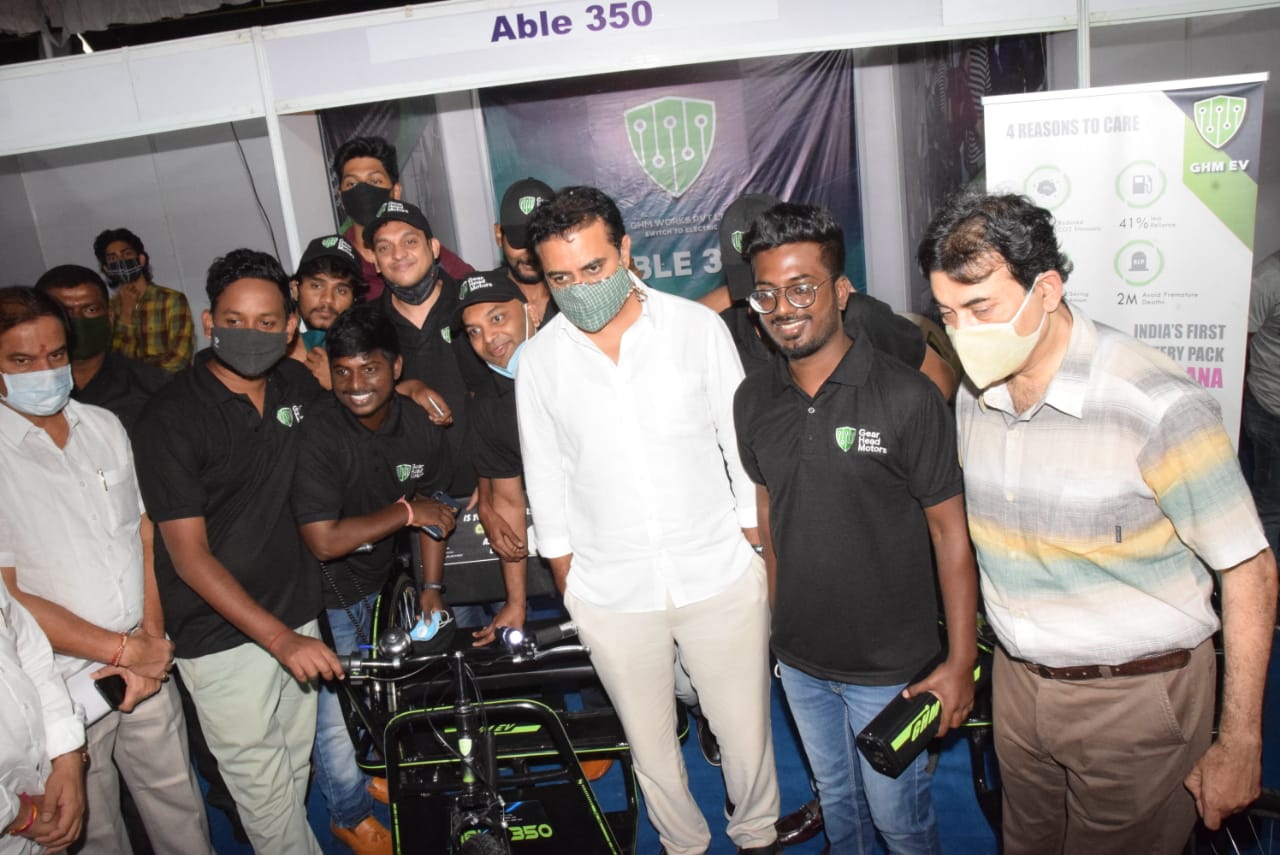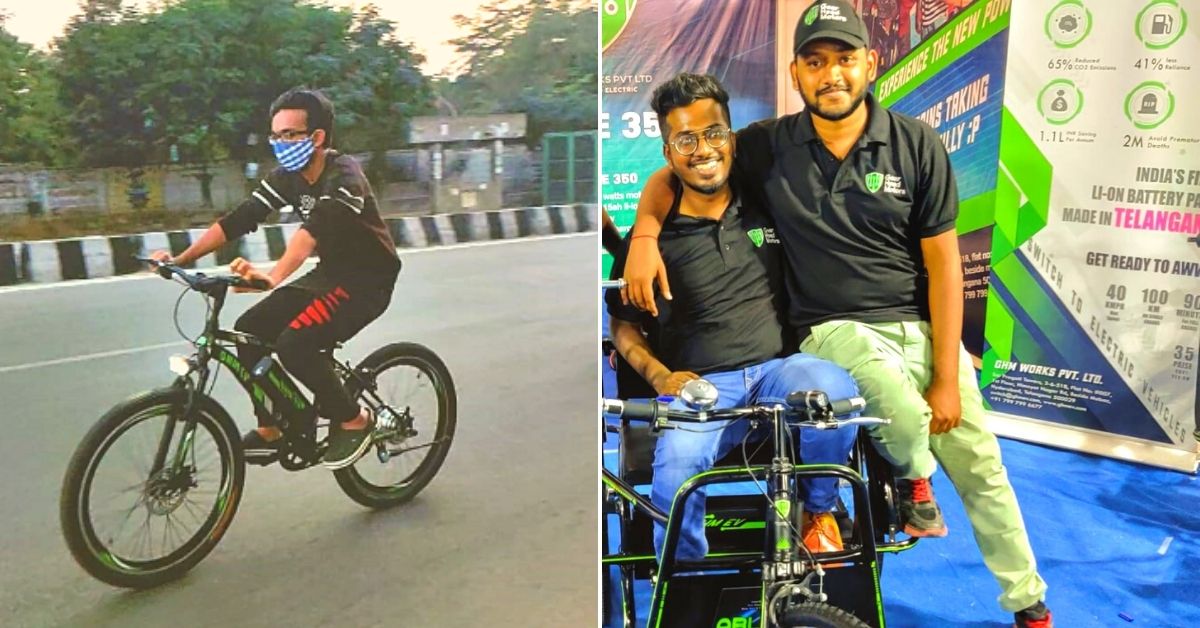Nikhil Gunda’s entrepreneurial journey began in his second semester of engineering college. Unhappy with the conventional career trajectory of a nine to five job set before him, the Hyderabad-native wanted to make some money quickly. So, what did he do? He set up his own coffee shop on the campus of Anurag University towards the end of 2015. (Image above Gear Head Motors’ upcoming e-bike on the left and co-founders on the right)
Once the varsity authorities gave permission to set up shop, business boomed. However, there was one small problem. There was a rush of students at his coffee shop during various breaks in the day. Nikhil solved this problem by developing an app on which students could pre-order their coffee. All they had to do was enter their phone number and college IDs and then collect their coffee.
The app he developed for his coffee shop soon transformed into DigiDine, a startup he co-founded in college with Arya Revanth in April 2016. Today, it’s a user behaviour management company for restaurants, powered by artificial intelligence (AI). With nearly 350 restaurants enrolled in the first year and a half, the business took off, and by January 2019, they sold the company to a Hyderabad tech company for an undisclosed six-figure sum.
However, around the time his DigiDine business was booming, Nikhil developed a real interest in electric vehicles (EVs). It was a trip to the Pink City (Jaipur) with his college senior Meher Sai, which inspired his desire to venture into the EV segment.
The proliferation of many EVs in Jaipur and their respective backgrounds in mechanical engineering inspired both of them to start a venture called Gear Head Motors (GHM) in Hyderabad. Today, the startup manufactures low-cost e-bikes with 80% of the components developed in-house. So far, it has sold more than 100 units and earned revenues of upto Rs 60 lakh. Besides selling e-bikes, the startup’s upcoming second vertical is converting two and three-wheeler IC-engine vehicles into electric.

A self-sustained model
Although Nikhil and Meher incorporated their company in 2018, they started work informally sometime in 2017, and spent a year conducting research and development.
“In the early months, we converted vehicles like the Omni van, Tata Nano and Maruti Suzuki Alto and other such vehicles with engines under 1,500 CC into EVs. These conversions, however, weren’t focussed on the business side of things. We were just testing our technology, but soon zeroed in on converting two and three-wheeler IC-engine vehicles into electric, particularly the latter where we saw great money saving potential for those who want to operate them. However, our first business venture was converting bicycles for major bicycle manufacturers such as Neelam into e-bikes. Working on a B2B model, we end up becoming technology partners with other bicycle manufacturing companies in Ludhiana to help them transition into electric,” says Nikhil tells The Better India.
GHM is now on the cusp of selling their own branded e-bikes. Slated for launch in June, their brand of e-bikes will be in more than 200 distribution centres across the country, he claims. They are taking pre-orders now.
All you need to do is ‘Say Hi’ to switch@ghmev.com.
Their range of e-bikes, called MEF (Made For Earth), comes in three models—M1 (Basic), S (Medium) and E (Pro). The Basic model gives customers a battery range of 50 km on a single charge with a 5.8 Ah lithium ion battery and is priced at Rs 18,999. The Medium model comes with a battery range of 70 km on a single charge and is priced at Rs 28,999. Finally, their Pro version gives riders a battery range of 100 km on a single charge and costs Rs 33,999. Although the Basic model comes with a 5.8 Ah battery, GHM gives riders the option of installing a 8.7, 11.6 and 15 Ah battery as well.
“We made our own detachable battery box made of aluminium alloy. It’s anodised, which acts as a cooling paint. In Indian temperatures, when the battery heats up, the battery box absorbs and transmits the heat outside. Our basic 5.8 Ah battery charges form 0 to 80% in 45 minutes with our 6 A fast charger. You can upgrade from our standard 3.5 A (Rs 2,500), which charges the vehicle fully in 2 hours, to 6 A (Rs 3,200) fast charging facility. Our batteries are also detachable and you can charge them at home. The interesting thing about our battery box carrying the 5.8 Ah battery is its compactness. It’s as big as a 500 ml water bottle. Our Medium and Pro e-bikes are complete mountain bikes or MTBs and can travel on all sorts of terrain with a top speed of 25 kmph. But we also have an option where you can choose to raise that to 40 kmph, because we use a 350-W motor in the e-bike,” says Nikhil.
GHM has used their expertise to establish partnerships with bicycle giants such as Neelam. It’s also in talks with Decathlon. So far, the startup has only shared their proof of concept with the company, but what’s important here is their ability to make their own components.
“Our startup designs 80% of our components including the battery box, bluetooth module, battery management system (BMS), control system, etc. We give third-party local manufactures the design and blueprint to manufacture these components. We only import the motor and lithium ion battery cells from China. This is the reason why companies like Decathlon and Neelam are interested in entering a partnership with us. We are not any other e-bike company sourcing all our components from different vendors and assembling it. The edge we offer is the in-house making of these components and trying to bring more advanced technologies like Machine Learning algorithms to understand battery and driver performance better even in low voltages such as 36 and 48 Volts,” Nikhil explains.
Converting three-wheelers into EVs
The EV conversion kit offered by GHM costs about Rs 1.5 lakh with a lithium phosphate battery. The electric auto rickshaw would have a top speed of about 60 kmph and a battery range of 150 km per charge, costing the driver just Rs 35 paise per km.
“So far, we have converted 10 auto rickshaws into electric, but with the right investment have the capacity to convert 50 to 60 autos in a week,” claims Nikhil
“If big companies launch their latest brand of three-wheelers, who’s going to buy them? They can’t afford it. Our focus is helping these auto drivers bridge the gap between IC-engine to electric. We are providing them with a platform to evolve,” he adds.
(Edited by Divya Sethu)
Like this story? Or have something to share? Write to us: contact@thebetterindia.com, or connect with us on Facebook and Twitter.
If you found our stories insightful, informative, or even just enjoyable, we invite you to consider making a voluntary payment to support the work we do at The Better India. Your contribution helps us continue producing quality content that educates, inspires, and drives positive change.
Choose one of the payment options below for your contribution-
By paying for the stories you value, you directly contribute to sustaining our efforts focused on making a difference in the world. Together, let's ensure that impactful stories continue to be told and shared, enriching lives and communities alike.
Thank you for your support. Here are some frequently asked questions you might find helpful to know why you are contributing?

